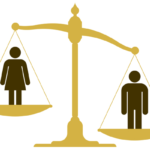World Discrimination Day is observed on March 1 annually around the world with the aim of safeguarding human rights ad dignity of the most vulnerable groups of our societies regardless of their age, gender, ethnicity, race, status, religion and region. The theme of this year, 2022, is ‘Zero Discrimination against Women and Girls’.
According to the UN World Population Prospects, 2021, there are more than 3.97 billion females out of 7.9 billion of the world’s population. Most of these vulnerable females, particularly in the African continent, are being asphyxiated by multidimensional grinding poverty around the world.
- Prominent Nigerians should intervene in Air Peace, Kano Emirate row – Group
- FIFA bans Russian national anthem, flag at matches
Nigeria’s females, accounting for more than 50 per cent of the country’s 214 million population, take part in marking this year’s WDD with an ineffable gloom-ridden challenges throwing them in a quandary and strangling them tactically. These challenges include lack of financial empowerment, abject poverty, gender disparity, economic inequality, domestic violence and lack of access to quality education.
Economic inequality or gender disparity is the outrageous genesis of multidimensional widespread poverty, particularly in our society since so many women are lacking chances for climbing up the social ladder.
In fact, the significance of investing in women and girls or empowering them to be self-reliant, cannot be underestimated towards hitting a myriad of birds down with one stone by achieving virtually all UN’s 17 Sustainable Development Goals by 2030.
Optimistically, the dawn of unparalleled empathy and sense of belonging for wiping off the tears of Nigeria’s vulnerable women and girl-child is now being witnessed across the country. President Buhari’s administration deserves to be commended for creating a vast array of social investment policies, under the Conditional Cash Transfer (CCT). It really gladdens my heart seeing more than 50 per cent of the CCT beneficiaries are poverty-stricken women, vulnerable girl-children and desolate widows.
Therefore, the attention of Nigeria’s authorities must continue to be brought to the fact that income inequality is indeed a grave threat to our country’s future generations.
The majority of these females are jobless stay-at-home mothers and stranded widows whose spouses died and left behind a burden of children for them. The country has statistically over eight million widows with over 21 million children.
I, therefore, strongly call on the three tiers of government, members of the legislatures, to bear in mind the fact that investing in our women and girls is key to obliterating the widespread poverty and building a brighter future our nation.
Mustapha Baba, Alkali Musa Street, Azare, Bauchi State
 Join Daily Trust WhatsApp Community For Quick Access To News and Happenings Around You.
Join Daily Trust WhatsApp Community For Quick Access To News and Happenings Around You.


